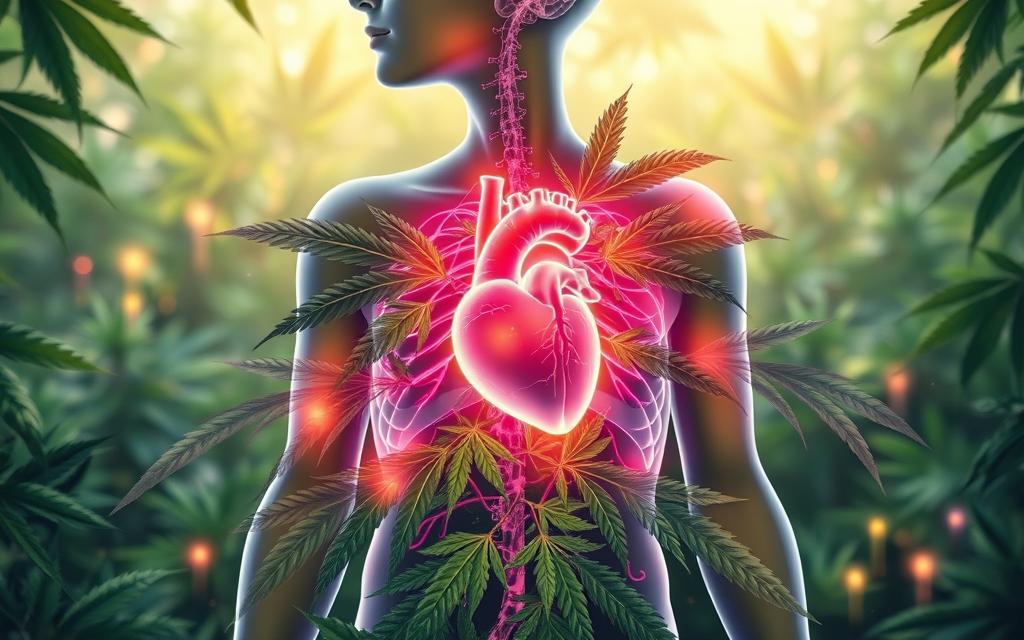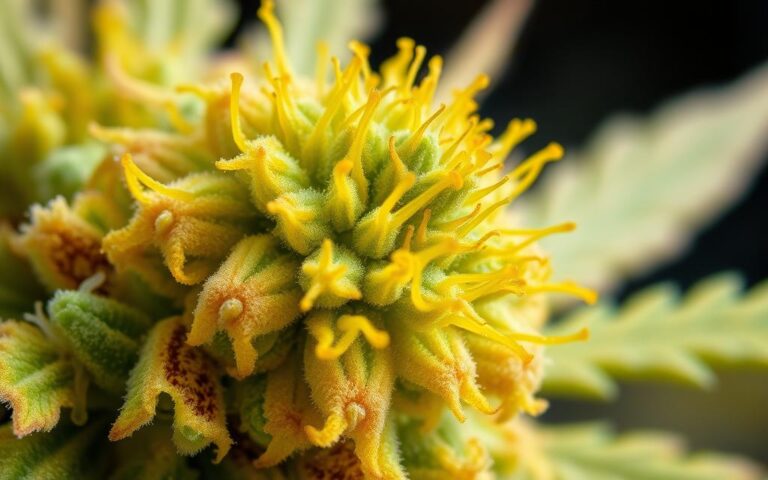Is Cannabis Really Good for You? Exploring the Health Benefits
Cannabis has become a hot topic in recent years. Many people want to know about its health benefits and risks. With 61.9 million people in the US using it in 2022, it’s key to look into its health effects.
It’s said to help with chronic pain and mental health issues. But, it’s important to know the risks too.
Studies show that 3 in 10 users might have a problem with it. It can mess with brain functions, raise heart rate, and make driving harder. Yet, many find it helps with stress, anxiety, and sleep.
As we explore cannabis, we must weigh its good and bad sides. This ensures we make smart choices about using it.
In this article, we’ll dive into cannabis research. We’ll talk about its benefits, risks, and why more studies are needed. By looking at the facts and expert views, we aim to give a fair view of medical cannabis.
This will help you understand its effects, whether for health reasons or just curiosity. We’ll cover all aspects, from benefits to risks and the latest research.
Understanding Cannabis and Its Components
Cannabis contains over 120 components, known as cannabinoids. Two well-known ones are cannabidiol (CBD) and tetrahydrocannabinol (THC). CBD is used to treat some types of epilepsy, while THC is known for its psychoactive effects.
Different cannabis forms, like dried flowers, oils, and edibles, are used for medicine. The strength of these forms varies. Flowers usually have a potency of 10% to 30%, while concentrates can be up to 90% strong.
Key Cannabis Components
- THC: known for its psychoactive effects
- CBD: used to treat certain types of epilepsy
- Other cannabinoids: they are being researched for their possible health benefits
It’s important to understand the different parts and forms of cannabis. Knowing the strength and effects of each helps people use cannabis safely and wisely.
| Cannabis Form | Potency |
|---|---|
| Flower | 10-30% |
| Concentrates | 40-90% |
| Edibles | varies |
The Historical Use of Cannabis in Medicine
Cannabis has a long cannabis history, with ancient roots. Dr. Peter Grinspoon says it’s been used for medicine for thousands of years. Ancient China, Egypt, and Greece used it for its healing powers.
They noted its anti-inflammatory effects and its use for depression.
Some of the key historical uses of cannabis include:
- Treatment of pain and anxiety in ancient India
- Use in traditional Chinese medicine for its therapeutic benefits
- Introduction to Western medicine, where it was used to treat various conditions
Today, cannabis research is revealing its therapeutic benefits. Studies show it can reduce inflammation, neuropathic pain, and anxiety. As we learn more, new treatments and therapies are emerging.

With ongoing cannabis research, we’ll see new uses for medical cannabis. Exploring its history and benefits is key. We must weigh its advantages and risks in modern medicine.
Is Cannabis Really Good for You: What Science Says
Cannabis science has made big strides in recent years. Many studies have looked into its benefits for health. Medical News Today says cannabis can help with chronic pain, multiple sclerosis, and mental health issues.
Recent studies have given us new insights into cannabis’s healing powers. For instance, a study in the Journal of Pain Research showed it helps with chronic pain in those with multiple sclerosis. Another study in the Journal of Clinical Psychopharmacology found it eases anxiety and depression in post-traumatic stress disorder patients.
The benefits of cannabis are well-documented, and research is always finding new uses. Some key benefits include:
- Reducing chronic pain and inflammation
- Improving mental health and reducing symptoms of anxiety and depression
- Treating multiple sclerosis and other neurological disorders
- Improving sleep quality and reducing insomnia
As cannabis science grows, it’s vital to keep up with the latest research. By exploring its benefits and staying informed, we can better understand cannabis’s role in medicine.
| Medical Condition | Cannabis Benefit |
|---|---|
| Chronic Pain | Reducing pain and inflammation |
| Mental Health | Reducing symptoms of anxiety and depression |
| Multiple Sclerosis | Improving symptoms and reducing inflammation |
Mental Health Applications of Cannabis
Cannabis is being studied for its mental health benefits. It may help with cannabis mental health issues. Research shows it can reduce anxiety and depression symptoms. It also helps with post-traumatic stress disorder (PTSD) and sleep problems, says Dr. Peter Grinspoon.
Key benefits of cannabis for mental health include:
- Reducing symptoms of anxiety and depression
- Treating PTSD
- Improving sleep quality
Studies suggest cannabis anxiety relief is a benefit. Also, cannabis PTSD treatment shows promise. But, more research is needed to fully understand its effects.

A study in Neuropsychopharmacology found cannabis and opioids together relieve pain well. Another study by Marcel Bonn-Miller tested different cannabinoids on 76 veterans with PTSD.
| Study | Participants | Results |
|---|---|---|
| Marcel Bonn-Miller | 76 veterans with PTSD | Comparing different cannabinoids |
| Mallory Loflin | 136 military veterans with PTSD | Testing the efficacy of CBD in conjunction with prolonged exposure therapy |
Physical Health Benefits of Cannabis
Cannabis offers many physical health benefits. It helps with cannabis pain relief and reduces cannabis inflammation. Adults with chronic pain often see a big drop in pain when using cannabis or cannabinoids.
It also helps with chronic pain thanks to its cannabinoids.
Some key benefits of cannabis include:
- Reducing chronic pain and inflammation
- Improving sleep quality
- Aiding in the healing of broken bones and strengthening bones during the healing process
- Helping to alleviate anxiety and depression
Cannabis also boosts lung capacity and helps with insulin regulation and calorie management. This makes it easier to keep a healthy weight. With its many benefits, cannabis is becoming a popular choice for treating various medical conditions, including cannabis physical health issues.

Potential Risks and Side Effects
Cannabis use can lead to cannabis risks like mental health issues and respiratory diseases. The Mayo Clinic notes that marijuana can cause headaches, dry mouth, and affect thinking.
A study on cannabis and serotonin syndrome shows the need to watch out for cannabis interactions with other drugs. This highlights the importance of using cannabis responsibly.
Some major concerns with cannabis use are:
- Increased risk of stroke, heart disease, and lung damage
- Potential for cannabis use disorder, mainly in adolescents
- Risk of psychotic symptoms, more so for those with a family history of psychosis or schizophrenia
Knowing these cannabis risks and cannabis side effects is key to safe use.
| Potential Risk | Description |
|---|---|
| Cannabis use disorder | Recognized in the DSM, with adolescents being more likely to develop the disorder |
| Psychotic symptoms | Particularly for individuals with a family history of psychosis or schizophrenia |
| Respiratory disease | Smoking marijuana can increase the risk of lung damage and other respiratory issues |
Medical Cannabis vs Recreational Use
Dr. Peter Grinspoon explains that medical cannabis is for treating specific health issues. On the other hand, recreational cannabis is for fun. Laws about these uses vary a lot, depending on where you are.
Some main differences are:
- Medical cannabis helps with chronic pain and nausea.
- Recreational cannabis is for enjoying and relaxing.
- Medical cannabis has stricter quality checks and rules.
- Recreational cannabis is easier to find and has fewer rules.
Recreational marijuana often has more THC, while medical marijuana has more CBD. Also, laws on recreational cannabis are stricter in many places than on medical cannabis.
Medical marijuana is easier to get in many places. To get it, patients need to show ID and a medical cannabis card. This is different from recreational users.
The differences between medical and recreational cannabis are big. It’s important to know the laws and rules for each to use them safely and responsibly.
| Type of Cannabis | THC Content | CBD Content | Accessibility |
|---|---|---|---|
| Medical Cannabis | Lower | Higher | More restricted |
| Recreational Cannabis | Higher | Lower | More widely available |
Safe Usage Guidelines and Recommendations
When using cannabis, cannabis safety is key. It’s important to follow the right cannabis dosing and cannabis administration rules. The Canada’s Lower-Risk Cannabis Use Guidelines highlight the risks, like dependence and accidents.
To stay safe, start with small doses and add more if needed. The way you use cannabis matters too. Knowing how each method works helps you use it wisely.
Here are some safe cannabis use tips:
- Start with low doses and gradually increase as needed
- Choose a method of cannabis administration that works for you, such as inhalation or ingestion
- Be aware of the possible risks, like dependence and cognitive issues
By following these guidelines, you can enjoy cannabis safely. Always talk to a doctor before using cannabis, if you have health concerns.
| Cannabis Use Category | Description |
|---|---|
| Abstinence | No cannabis use |
| Beneficial use | Cannabis use with therapeutic benefits |
| Non-problematic use | Cannabis use without negative consequences |
| Problematic use | Cannabis use with negative consequences |
| Cannabis use disorder | Cannabis use with significant impairment or distress |
Conclusion: Making an Informed Decision About Cannabis Use
As we wrap up our look at cannabis’s health benefits and risks, it’s clear that making an informed decision is key. The research on cannabis is vast and always changing. It shows both the good and the areas that need more study.
When it comes to cannabis decision, it’s up to each person. But knowing the science behind it is vital. This knowledge helps use cannabis wisely, with the help of doctors.
The laws around cannabis are changing too. Some places allow it, while others don’t. It’s important to keep up with these changes. The laws and what you can buy can differ a lot.
Deciding to use cannabis should be a thoughtful choice. It’s important to look at the latest science, think about your own situation, and talk to a doctor. By being well-informed and making smart choices, you can enjoy cannabis’s benefits while avoiding its risks.










